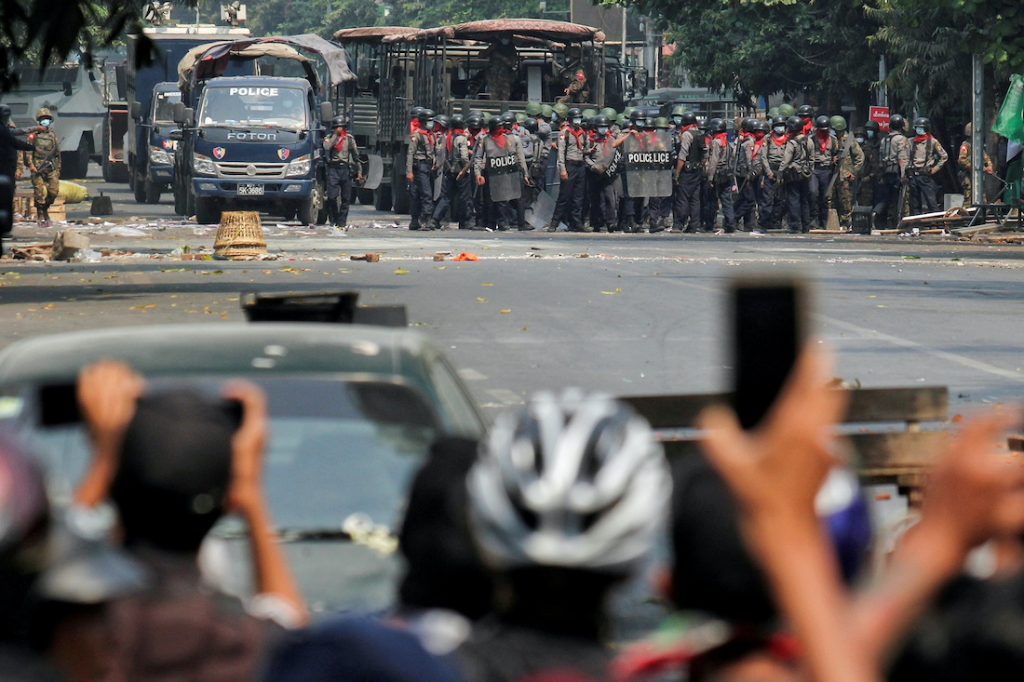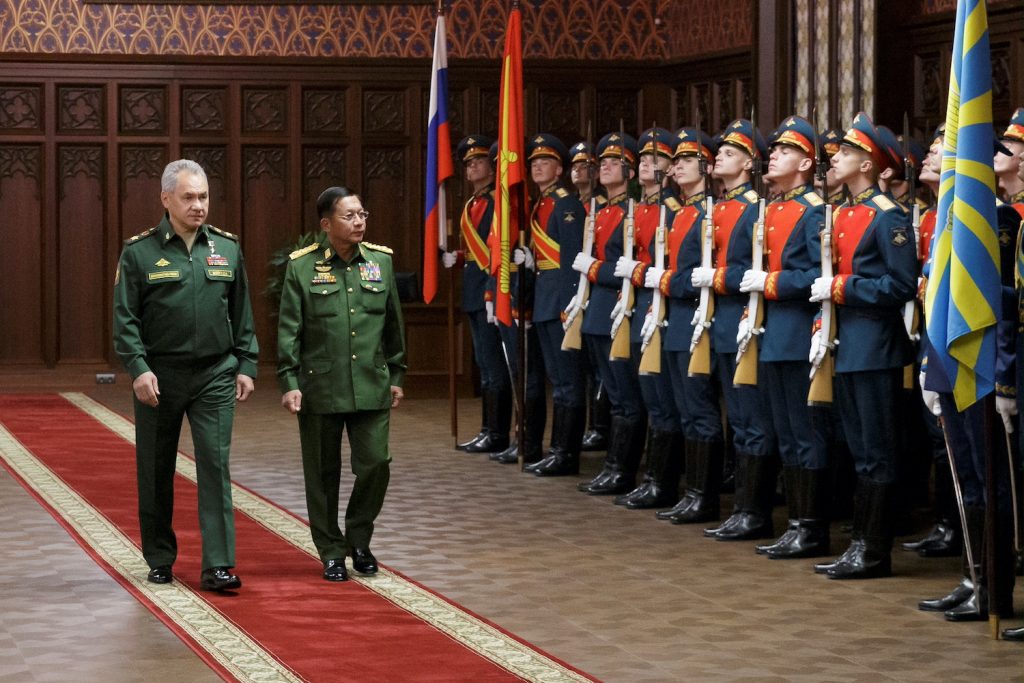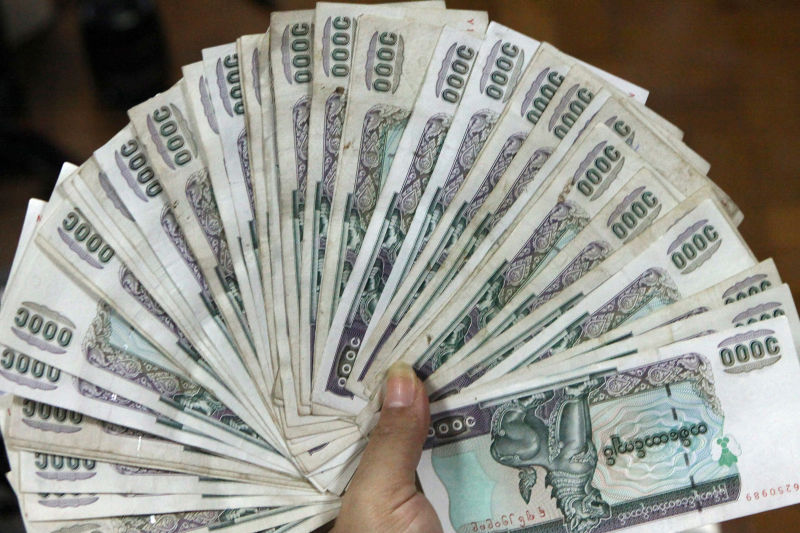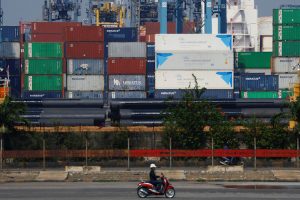The latest sanctions imposed by the European Union and the United States against the Myanmar military and various state entities and officials look to be slowly eroding the army’s financial ability to wage war.
They are also undermining the kyat – the local currency, which continues to lose value against the Thai baht and the US dollar.
The European Union announced a seventh round of sanctions on July 20 in response to what it said was the escalation of violence and human rights violations since the 2021 military coup that overthrew elected leader Aung San Suu Kyi.
ALSO SEE: Cambodia Stages One-Sided Election Ahead of Power Shift
The EU’s new sanctions target six people and one entity, including the ministers for immigration and population, labour, and health and sports, it said in a statement.
“Restrictive measures currently apply to a total of 99 individuals and 19 entities. Those designated are subject to an asset freeze and a travel ban, which prevents them from entering or transiting through EU territory,” it said.
“In addition, EU persons and entities are prohibited to make funds available to those listed.”

US sanctions 2 state banks, Defence ministry
The EU sanctions followed action by the US Treasury in late June, which added two state banks – the Myanma Foreign Trade Bank (MFTB) and Myanma Investment and Commercial Bank (MICB), and the Ministry of Defence to its list of sanctioned entities.
The Myanmar junta has been accused of near-daily attacks on civilians in many parts of the country, with regular airstrikes near areas of conflict in the north, northwest and southeast.
UN Rapporteur Tom Andrews said in March he was concerned about UN member states and “non-state entities” providing the junta with weapons, or materials to make weapons, plus “revenue that is being used to commit war crimes and crimes against humanity.”
Andrews said he regularly received “reports of massacres of civilians, including beheadings, and dismemberment”. More than 3,000 civilians had been killed and over 1.3 million people displaced at that point. More than 16,000 political prisoners were behind bars and “six million people are in dire need of humanitarian assistance”.
UN Rapporteur listed states supplying arms

In May, Andrews tabled a report with the Human Rights Council entitled ‘The Billion Dollar Death Trade: The International Arms Networks that Enable Human Rights Violations in Myanmar’.
It said the Myanmar military had received at least $1 billion worth of weapons, technology or materials used to make weapons since the coup. He listed over 12,500 purchases or shipments of weapons, and identified “many of the major networks and companies involved in these transactions and the jurisdictions in which they operate.”
He said key deals included:
- $406 million from entities in the Russian Federation, such as state-owned entities;
- $267 million from entities in China, including state-owned entities;
- $254 million from entities operating in Singapore;
- $51 million from entities in India, including state-owned entities;
- and $28 million from entities operating in Thailand.
This involved “helicopters, reconnaissance and attack drones, advanced missile systems, tank upgrades, radio and communication equipment, radar complexes, and components for naval ships, spare parts for fighter jets.
It also involved machinery, tools, equipment and critical raw materials for weapons factories run by the Myanmar military’s Directorate of Defence Industries (DDI), known as the “Ka Pa Sa.”

Andrews noted that “unlike Russia, China and — to a much lesser extent — India, he had received no information indicating that entities owned or controlled by the governments of Singapore or Thailand, or the governments themselves, have approved or transferred arms to the Myanmar military.
“Rather, arms dealing organizations appear to be using the jurisdictions of Thailand and Singapore, and specifically the banking and shipping sectors there, to facilitate arms transfers.”
Singapore, he said, “has become a major jurisdiction for spare parts, raw materials, and manufacturing equipment sent to the Myanmar military. Entities operating in Singapore have become critical to the continued operation of Myanmar’s Ka Pa Sa weapons factories. At least 138 Singapore-based firms have served as intermediaries for the Myanmar military since the coup.”
Arms dealers evading bans, MOGE a key entity
But he said: “Arms dealers have been easily able to circumvent sanctions imposed by the United States, the European Union, the United Kingdom, and Canada by using front companies and creating new companies to evade them.”
Myanma Oil and Gas Enterprise (MOGE) was likely the largest single source of foreign currency for the Myanmar State Administration Council, as the junta is now called, but it has only been sanctioned by the EU. And at that stage no state had put sanctions on Myanma Foreign Trade Bank since the coup (although Canada still has them from 2007).
The SAC “also retains near unfettered access to billions of dollars of the State of Myanmar’s foreign exchange reserves because they have not been cut off,” he said.
Andrews noted that sanctions against MFTB and MICB could deprive the junta of an estimated $2 billion per year, as MFTB had at least 72 “nostro” accounts – foreign currency holdings at other banks – in a network of 50 correspondent banks around the world, including in the US, Singapore, UK, Malaysia, Bangladesh, Germany and Switzerland.
The Myanmar media outlet Frontier cited an analyst who said the US moves sought to disrupt Myanmar’s ability to purchase “arms, aviation fuel, dual use technologies”, plus its ability to take in money.
It also quoted a source who said EU sanctions had prevented the junta accessing half a billion dollars, as of April, most of which was reportedly revenue from the Chinese gas pipeline.
Thus, US moves appear to be aimed at Andrews’ goal of limiting atrocities by making it harder for the junta to access and use foreign revenue to import arms.
Treasury officials noted that the MFTB and MICB “function as foreign currency exchanges” that help the MOGE generate revenue.
Meanwhile, a recent report by a military analyst in Bangkok suggests that the “revolutionary forces” opposed to the junta have made key gains against the SAC.
But it could be a long war. And as the World Bank said in June, the economic and human toll from the coup has already been enormous.
- Jim Pollard with Reuters
ALSO SEE:
Toyota Begins Business at Myanmar Plant After Coup Delay
Crime Gangs Control Some Myanmar, Laos Economic Zones: UN
Myanmar Sets Up China-Made CCTVs in More Cities
Myanmar-China Traders Battered by Forex Rates, New Rules
Economic Damage Intensifies After Coup in Myanmar
Myanmar Coup: Did the Generals Fear Losing Their Billions?
























